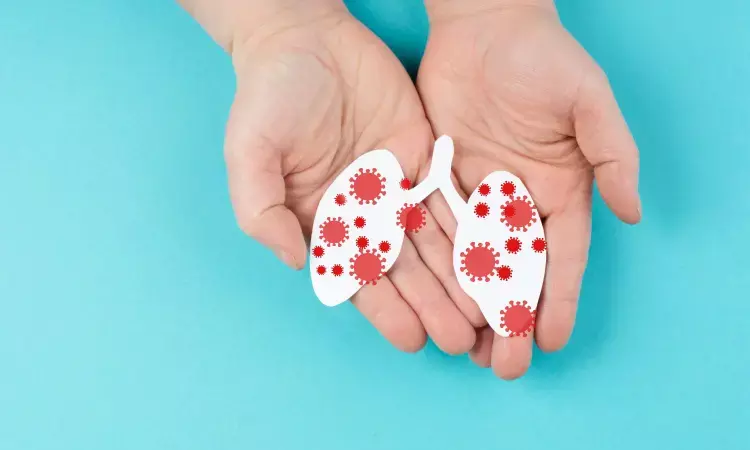- Home
- Medical news & Guidelines
- Anesthesiology
- Cardiology and CTVS
- Critical Care
- Dentistry
- Dermatology
- Diabetes and Endocrinology
- ENT
- Gastroenterology
- Medicine
- Nephrology
- Neurology
- Obstretics-Gynaecology
- Oncology
- Ophthalmology
- Orthopaedics
- Pediatrics-Neonatology
- Psychiatry
- Pulmonology
- Radiology
- Surgery
- Urology
- Laboratory Medicine
- Diet
- Nursing
- Paramedical
- Physiotherapy
- Health news
- Fact Check
- Bone Health Fact Check
- Brain Health Fact Check
- Cancer Related Fact Check
- Child Care Fact Check
- Dental and oral health fact check
- Diabetes and metabolic health fact check
- Diet and Nutrition Fact Check
- Eye and ENT Care Fact Check
- Fitness fact check
- Gut health fact check
- Heart health fact check
- Kidney health fact check
- Medical education fact check
- Men's health fact check
- Respiratory fact check
- Skin and hair care fact check
- Vaccine and Immunization fact check
- Women's health fact check
- AYUSH
- State News
- Andaman and Nicobar Islands
- Andhra Pradesh
- Arunachal Pradesh
- Assam
- Bihar
- Chandigarh
- Chattisgarh
- Dadra and Nagar Haveli
- Daman and Diu
- Delhi
- Goa
- Gujarat
- Haryana
- Himachal Pradesh
- Jammu & Kashmir
- Jharkhand
- Karnataka
- Kerala
- Ladakh
- Lakshadweep
- Madhya Pradesh
- Maharashtra
- Manipur
- Meghalaya
- Mizoram
- Nagaland
- Odisha
- Puducherry
- Punjab
- Rajasthan
- Sikkim
- Tamil Nadu
- Telangana
- Tripura
- Uttar Pradesh
- Uttrakhand
- West Bengal
- Medical Education
- Industry
Nirsevimab effective in preventing hospitalization for RSV associated lower RTI in infants

Respiratory syncytial virus (RSV) is a common cause of lower respiratory tract infection in young children and infants, leading to hospitalization.
According to a study published in the New England Journal of Medicine, Nirsevimab protected infants against hospitalization for RSV-related lower respiratory infections in conditions that approximated real-world settings.
The aim of the study was to establish safety and efficacy of nirsevimab (monoclonal antibody) in preventing hospitalizations for RSV-related lower respiratory tract infections in healthy infants.
Researchers randomly assigned 12-month-old infants or younger, born at least 29 weeks gestational age and entering their first RSV season in France, Germany, or the UK, to receive a single intramuscular injection of nirsevimab or standard care before or during the RSV season.
The primary endpoint was hospitalization for RSV-associated lower respiratory tract infection. The secondary endpoint was a very severe RSV-associated lower respiratory tract infection with an oxygen saturation of less than 90% and the need for supplemental oxygen.
Key points from the study are:
- A total of 8058 infants were randomly assigned: 4037 in Nirsevimab and 4021 in the care group.
- Eleven infants and 60 infants in the nirsevimab and standard-care group were hospitalized for RSV-associated lower respiratory tract infection. This corresponded to a nirsevimab efficacy of 83.2%.
- Very severe RSV-associated lower respiratory tract infection occurred in 5 infants in the nirsevimab group, representing its efficacy as 75.7 %.
- The efficacy of nirsevimab against hospitalization for RSV-associated lower respiratory tract infections in France, Germany, and the UK was 89.6%, 74.2%, and 83.4%, respectively.
- 86 infants in the nirsevimab group experienced adverse events.
Study limitations include short study duration and trial design.
They found Nirsevimab to be protective against hospitalization for RSV-associated lower respiratory tract infections and against very severe RSV-associated lower respiratory tract infections in infants.
Sanofi and AstraZeneca funded the study.
Reference:
Simon B. Drysdale et al. Nirsevimab for Prevention of Hospitalizations Due to RSV in Infants. (n.d.). N Engl J Med 2023; 389:2425-2435
BDS, MDS in Periodontics and Implantology
Dr. Aditi Yadav is a BDS, MDS in Periodontics and Implantology. She has a clinical experience of 5 years as a laser dental surgeon. She also has a Diploma in clinical research and pharmacovigilance and is a Certified data scientist. She is currently working as a content developer in e-health services. Dr. Yadav has a keen interest in Medical Journalism and is actively involved in Medical Research writing.
Dr Kamal Kant Kohli-MBBS, DTCD- a chest specialist with more than 30 years of practice and a flair for writing clinical articles, Dr Kamal Kant Kohli joined Medical Dialogues as a Chief Editor of Medical News. Besides writing articles, as an editor, he proofreads and verifies all the medical content published on Medical Dialogues including those coming from journals, studies,medical conferences,guidelines etc. Email: drkohli@medicaldialogues.in. Contact no. 011-43720751


